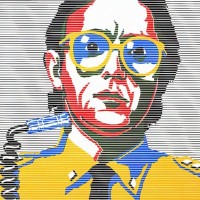Manu Dibango has a knack for perfectly balancing the lithe American jazz form with the more exotic joys of traditional African music.
What’s almost criminal is that he couldn’t elicit a second glance on your average U.S. sidewalk. Dibango, who was 60 at the time Wakafrika was issued in 1994, actually scored his first international hit in 1972, the million-selling “Soul Makossa.” This star-laden studio project was meant to recall those past glories, turning him back into a household name, but for whatever reason ultimately did not.
You certainly couldn’t blame the music. Layered drum and bass signatures combine with a deft appreciation for both pop and jazz on Wakafrika, creating a perfect example of what Manu Dibango dubbed “afro-soul jazz.” That’s why this project, despite its relative lack of commercial success, has shown a remarkable resilience where other “world music” releases of the time wilted into nostalgia.
The album kicked off, appropriately enough, with a nifty reworking of Dibango’s most famous song, but this time “Soul Makossa” features the cryingly rapturous voice of Youssou N’Dour. Many remember the Senegalise star for his earlier turn on Peter Gabriel’s single “In Your Eyes.” Following that (what do you know?) was a bouncy update of Gabriel’s “Biko” – a tune that features the former Genesis frontman as well as Ladysmith Black Mambazo, after their earlier work on Paul Simon’s Graceland LP.
There were new joys here: Whereas the original version of “Biko,” dedicated to a slain anti-apartheid activist, once held such elegiac sorrow, Dibango reimagined it with an upbeat fortitude. Add the familiar echo of Gabriel’s voice, then the breezy trills of Ladysmith, and you had, really, a more perfect track.
The title tune featured the coiled bass of a dance number, the honky sax of a Blue Note side, and the lightest of guitar licks. “Wakafrika,” the song, made clear the intentions of Wakafrika, the album: Dibango’s effort would be consistently marked by elliptical beats, resilient horn blasts and heartening choruses.
Also of particular note was a redo of “Homeless,” which on Graceland featured Ladysmith’s unaccompanied vocals. Here, it became a kind of cabaret groove number. Sinead O’Connor emerged as a fervent, even funky, backup singer. And Manu Dibango pleasantly hiccuped his way through, displaying the best of his quivering, even longing saxophone sound.
It is simply a delight – though never, of course, all that simple at all.
- The Bright Spots in George Harrison’s Troubled ‘Dark Horse’ Era - December 29, 2024
- The Pink Floyd Deep Cut That Perfectly Encapsulates ‘The Wall’ - November 29, 2024
- Why Pink Floyd’s ‘The Endless River’ Provided a Perfect Ending - November 11, 2024



